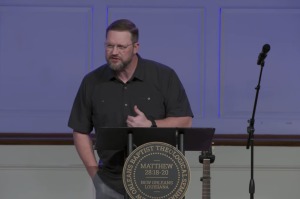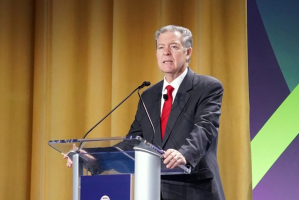Going Beyond 'Thou Shalt Not' Teen Sex Talk
Purity ceremonies and abstinence pledges are widespread across churches but one youth pastor suggests the common practice in its current context may be outdated.
In the event of one purity ceremony where teens promised to wait until marriage to have sex, Justin Spurlock, director of youth ministries at University Presbyterian Church in Fresno, Calif., expressed concern that sexual purity was "often narrowly defined simply as keeping one's virginity intact."
"Teens were left with very little to face the daily strain of dealing with sexual issues in their worlds," he stated in the July/August 2007 issue of The Journal of Student Ministries.
Just before the purity ceremony, a bi-annual teaching series on sexuality at the church Spurlock was to begin ministering at featured "scattered" scripture verses discussing sexuality and relationships, the abstinence message and talks on consequences of premarital sex.
"The whole series was often guilt-centered and consequence-heavy," Spurlock described. "[T]he method was not necessarily a helpful and effective way of approaching 21st century students" who live in an over-sexed culture.
Although the teaching series explored Scripture in the beginning, the messages were "attached to the primary message of guilt and consequences."
What he found missing was "a robust theology and ethic" or a theological foundation.
When Spurlock began searching in articles and books for a cohesive and effective theology of sexuality, he didn't find many.
"Most [articles] advocated that teenagers 'keep their pants on' and just wait until marriage," he stated. "There were no positive messages about how believers were to faithfully and righteously live as the sexual beings that God had created us to be.
"Sex was considered a function rather than a practice."
When confronting parents on the matter of sex talks in the church, some expected youth leaders to teach healthy sexual practices because teenagers are going to have sex anyway. Others wanted teachings on abstinence, period. And still others thought the best they could get is students who had safe sex, treated the other gender with respect and didn't use others for selfish pleasure or gain.
"The real problem was that no one spoke in the context of the Christian faith ... a framework of understanding reality through the life, death and resurrection of Jesus Christ ..." said Spurlock. "A robust faith that could intersect reality, allowing our students to bring healing into our messed-up sexual world, was missing."
With the help of Kenda Creasy Dean's Practicing Passion, Spurlock began exploring a theology of sexuality and has developed a linguistic framework for parents to understand their children's sexuality.
It begins with the film "Flame" from the Nooma series of Rob Bell, founding pastor of Mars Hill Church in Grandville, Mich. "Flame" explores the power of passion, commitment, and companionship built into the human person. When Spurlock met with the parents who had expressed their concerns, he found that the film helped dissipate their fears and help stir discussion on sexuality in an abstract way.
Spurlock then goes into a series outline on such topics as "How we're all screwed up sexually because we're all affected by our 'pornified' world" and "God intended sexuality to be a gift of intimacy."
"We are all corrupted already and we must find a way to be healed."
The series further explores the key theological issue of the human being – what does it mean to be human and made in the image of God?
"Humans are made as sexual beings," stated Spurlock. "Thus, sexuality is a gift that must be stewarded."
More than a "thou shalt not" message, Spurlock emphasizes teaching young people what it means to be a sexual being.
The series outline also articulates the response that such a theological orientation calls forth – "fidelity as a formative Christian practice."
"These parents were realizing that intimacy is the key issue, that sexual brokenness is a problem of broken intimacy, and that forming young people who can find intimacy in our distant, hardened, thick-skinned society is one of our chief tasks," Spurlock stated.
Urging the need for youth leaders to provide parents a robust framework on the issue of sexuality, Spurlock said, "the move from pregnancy [that parents fear] to a focus on fidelity is not as distant as it may seem."



























